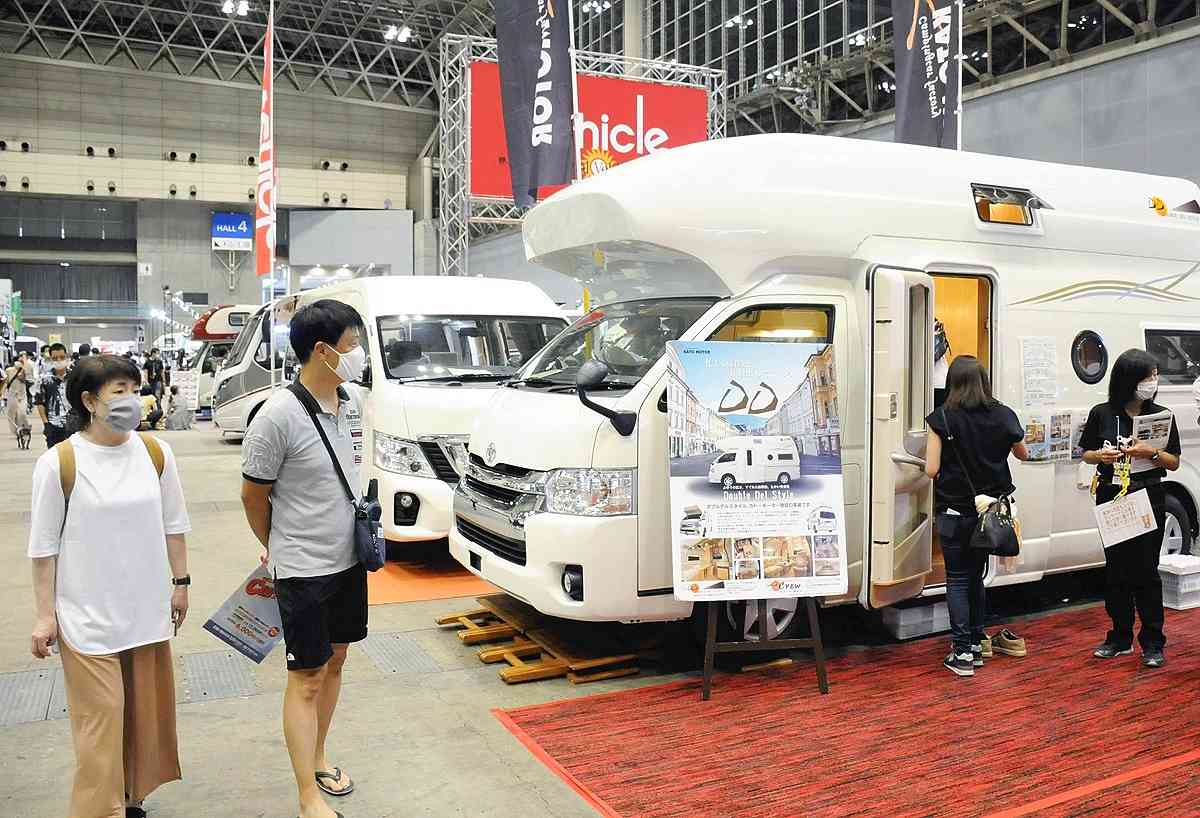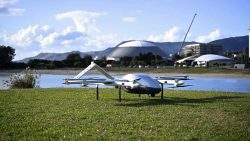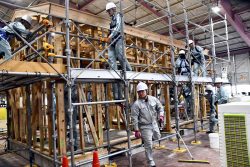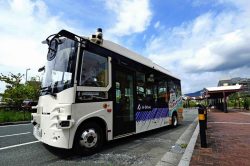Business Reboot / Moves to Repurpose Vehicles as Mobile Offices Gain Traction in Japan

An event featuring recreational vehicles at Makuhari Messe in Chiba in September attracted about 11,300 visitors over its three days.
14:09 JST, December 1, 2020
This is the fifth and final installment in a series that explores how the auto industry plans to survive in the novel coronavirus era.
***
Taking a car, train or bus to go to work — this daily routine has changed due to the novel coronavirus outbreak. Workplaces are becoming more and more dispersed to prevent infections through such measures as teleworking.
When Honda Motor Co. electric components engineer Hiroyuki Kurokawa wants to be alone to concentrate on his work, he gets in a Honda e, an electric vehicle launched in October.
Inside, he is not distracted by people talking. As the car is equipped with a 100 volt power supply, the same as at home, and Wi-Fi, he has no problem having teleconferences or working on a computer.
Of course, he can also drive the EV, which doesn’t make any engine noise.
“For a change of atmosphere, I can drive to a place with a good view and then do my work there,” Kurokawa said.
EVs have already drawn people’s attention with their excellent environmental performance, and now they are likely to further benefit from a tailwind related to the novel coronavirus.
“We will pursue value that is more than just a means of transportation,” said Tomofumi Ichinose, who is responsible for the vehicle’s development. “I’m also certain this car’s EV technology meets today’s demand.”
Adding value to mobility
Recreational vehicles equipped with bedrooms and kitchenettes are gaining popularity, too.
Auto One, a company in Fujisawa, Kanagawa Prefecture, sells RVs converted from mini-vehicles. In October and November, it received more than twice as many orders as during the same period last year.
Such modified RVs are less expensive than regular RVs and are easier to drive due to their smaller size. This type of vehicle has been popular mainly among retired couples, but has also started to attract a wider range of people due to the novel coronavirus crisis.
In some cases, this vehicle is so popular that customers have to wait for as long as a year until delivery.
The company started to receive a larger number of inquiries since July, when the government’s Go To Travel tourism promotion campaign was launched.
“I think this is because the initial public mood to refrain from going out has changed,” said Hideyuki Aoki, the representative of the company, based on his analysis. “The feeling is spreading that people are allowed to go be-yond prefectural borders.”
Orix Auto Corp. in Minato Ward, Tokyo, has introduced mobile office vehicles for businesses to rent.
The company’s usual customers are construction companies that use these vehicles instead of building prefab offices. These days, these vehicles are attracting a wider range of users. In particular, financial institutions have requested to have them equipped with ATMs to create mobile banking facilities. The desire is to avoid the so-called Three Cs — closed spaces, crowded places and close-contact settings — at their ordinary facilities.
Carpooling via taxi
Other initiatives are emerging, too.
For the June-September period, start-up company NearMe conducted a demonstration test of a carpooling service for commuting.
Riders use a smartphone app to request a taxi company’s van to pick them up. Each van picks up these riders and drives them to their respective destinations using the most appropriate route selected by artificial intelligence.
The company is considering providing a full-fledged service after receiving many favorable responses such as, “There is no need to take a very crowded train, so there is a lower risk of infection.”
On Nov. 16, NearMe started another demonstration test of the service in cooperation with major real estate company Mitsubishi Estate Co. This test is scheduled to run through Feb. 15, 2021, providing the carpooling service to residents in five Tokyo wards, including Setagaya Ward, for shopping and commuting.
“Due to the novel coronavirus pandemic, people have become more likely to avoid using mass transit and to shift to individual transit,” said Koichiro Takahara, president of nearMe.
Even when the coronavirus epidemic is under control, it is highly likely that behavioral patterns and attitudes, once they have changed, will not return to how they were in the past. To survive this situation, businesses are required to take flexible approaches to change without being bound by conventional thinking.
Top Articles in Business
-

Japan, Italy to Boost LNG Cooperation; Aimed at Diversifying Japan’s LNG Sources
-

Honda to Launch New Electric Motorbike in Vietnam
-

Asics Opens Factory for Onitsuka Tiger Brand in Western Japan
-

Japan’s ANA to Introduce Nationwide Logistics Service Using Drones, Will Be Used to Deliver Supplies in Remote Areas
-

JR Tokai, Shizuoka Pref. Agree on Water Resources for Maglev Train Construction
JN ACCESS RANKING
-

Univ. in Japan, Tokyo-Based Startup to Develop Satellite for Disaster Prevention Measures, Bears
-

JAL, ANA Cancel Flights During 3-day Holiday Weekend due to Blizzard
-

China Confirmed to Be Operating Drilling Vessel Near Japan-China Median Line
-

China Eyes Rare Earth Foothold in Malaysia to Maintain Dominance, Counter Japan, U.S.
-

Japan Institute to Use Domestic Commercial Optical Lattice Clock to Set Japan Standard Time
























